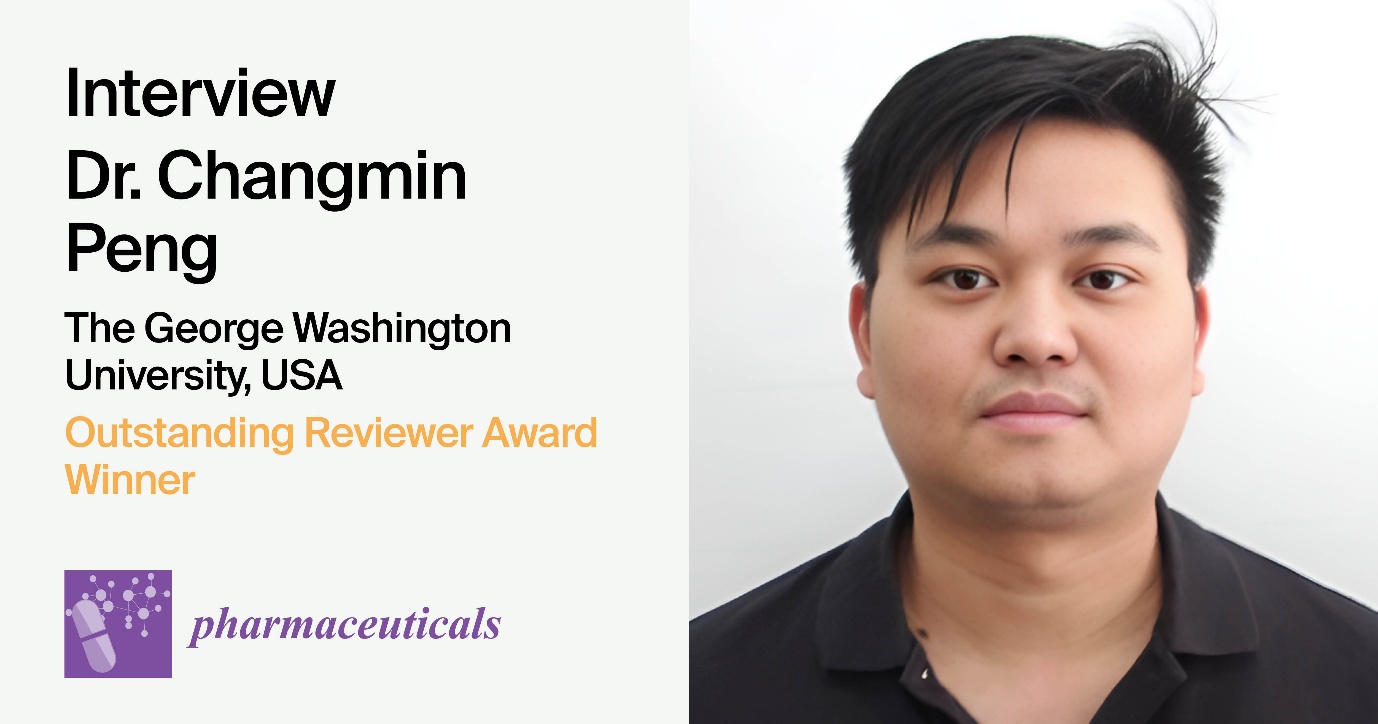
Interview with Dr. Changmin Peng—Winner of the Pharmaceuticals 2024 Outstanding Reviewer Award
Name: Dr. Changmin Peng
Affiliation: The George Washington University, USA
We wish to congratulate Dr. Changmin Peng on winning the Pharmaceuticals Outstanding Reviewer Award. We had the pleasure of inviting him to this interview, in which we learned more about his background, insights, and interests.
The following is a brief interview with Dr. Changmin Peng:
1. Could you give a brief introduction of yourself to our readers? What’s your current research area?My name is Changmin Peng, and I am currently a Research Scientist in the Department of Biochemistry and Molecular Medicine at the George Washington University School of Medicine and Health Sciences. I received my Ph.D. in fermentation engineering from Tianjin University of Science and Technology. During my Ph.D. training, I conducted research at the National Center for Protein Sciences (Beijing), where I received extensive training in molecular biology and cancer signaling, particularly focusing on the DNA damage response and O-GlcNAcylation in cellular stress pathways.
Currently, my research is centered on the biological functions and enzymatic activities of histone deacetylases (HDACs), with a particular interest in the non-canonical activities of HDACs beyond histone modification. My recent work has focused on HDAC11 and its novel role as a lysine defatty-acylase. I am investigating how HDAC-mediated deacylation regulates protein stability, localization, and signaling pathways—especially those involved in cancer progression and immune regulation. This research not only expands our understanding of HDAC biology but also provides potential targets for therapeutic development.
There are several reasons that motivate me to serve as a reviewer for Pharmaceuticals.
Firstly, I see peer review as a great opportunity to expand my academic visibility and influence within the scientific community.
Secondly, reviewing manuscripts allows me to critically assess scientific questions from different perspectives, which often provides inspiration and new angles for my own research projects.
Lastly, I simply enjoy staying engaged. Taking on different tasks outside my own experiments brings me a sense of fulfillment and offers valuable experiences that enrich both my professional and personal growth.
In addition, I truly appreciate the high academic standards and broad interdisciplinary scope of Pharmaceuticals. The editorial team is highly professional, and the peer review process is both efficient and rigorous, making it a rewarding experience to contribute as a reviewer.
It has been a very positive and rewarding experience to serve as a reviewer for Pharmaceuticals. The manuscripts I have reviewed so far cover a wide range of topics in pharmacology, drug development, and molecular mechanisms, many of which align closely with my research interests. I find the review process to be well-organized and the editorial communication to be timely and clear.
One thing I particularly appreciate is that Pharmaceuticals values constructive feedback, encouraging reviewers to help authors improve their work rather than simply accept or reject it. This creates a more collaborative and academic environment, which I deeply respect.
Overall, I’ve found that reviewing for Pharmaceuticals not only contributes to the scientific community but also helps me grow as a researcher by exposing me to emerging ideas and methodologies.
When reviewing a manuscript, I usually focus on three main aspects:
Firstly, I evaluate whether the experimental design is appropriate and whether the study has conceptual significance. A well-formulated research question with a clear rationale is essential.
Secondly, I look at whether the data are rigorous and reliable, and whether they logically and sufficiently support the authors’ conclusions.
Thirdly, I assess the overall data quality, including how clearly the results are presented. I pay attention to whether the data appears clean and interpretable, or if there are signs of over-interpretation or overstatement.
If the manuscript demonstrates sound design, solid data, and clear presentation, I am generally supportive and often recommend revision or acceptance.
I am truly honored to receive this Outstanding Reviewer Award from Pharmaceuticals. This recognition means a lot to me and serves as great encouragement to stay engaged in scientific communication and peer review.
I would like to express my heartfelt gratitude to my former mentors and colleagues at the National Center for Protein Sciences in Beijing. During my training there, I received not only solid technical guidance but also a deep and rigorous foundation in scientific thinking. Their patient mentorship taught me how to approach and dissect scientific questions critically and systematically.
I am also deeply thankful to my current advisor at George Washington University, who has provided me with a supportive and open research environment. The freedom to explore new directions and think independently has been incredibly valuable for my personal and professional growth.
Science is never a solo journey. I’m fortunate to have met many inspiring mentors, collaborators, and peers along the way. I’m also grateful to Pharmaceuticals for giving me the opportunity to contribute to the peer review process and to grow as a researcher through these engagements.
